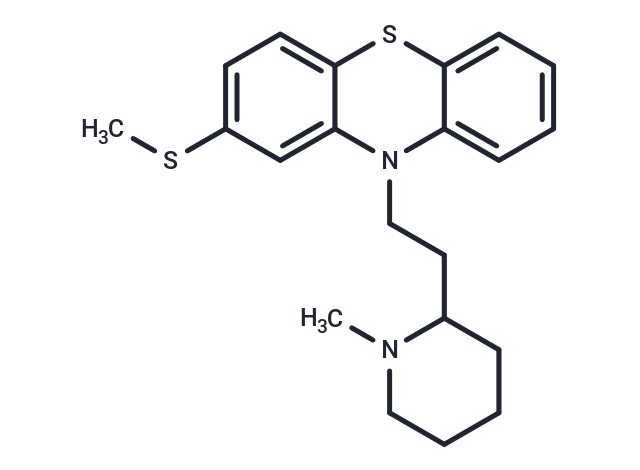Shopping Cart
- Remove All
 Your shopping cart is currently empty
Your shopping cart is currently empty

Thioridazine is a chemical compound characterized by its potent anti-psychotic and anti-anxiety activities. As an antagonist of the dopamine receptor D2 family proteins, it exhibits a strong inhibitory effect on the PI3K-Akt-mTOR signaling pathways, resulting in anti-angiogenic effects. It also demonstrates significant antiproliferative and apoptosis induction effects in a diverse range of cancer cells, specifically targeting cancer stem cells (CSCs) [1] [2] [3] [4].

| Pack Size | Price | Availability | Quantity |
|---|---|---|---|
| 25 mg | $1,520 | 1-2 weeks | |
| 50 mg | $1,980 | 1-2 weeks | |
| 100 mg | $2,500 | 1-2 weeks |
| Description | Thioridazine is a chemical compound characterized by its potent anti-psychotic and anti-anxiety activities. As an antagonist of the dopamine receptor D2 family proteins, it exhibits a strong inhibitory effect on the PI3K-Akt-mTOR signaling pathways, resulting in anti-angiogenic effects. It also demonstrates significant antiproliferative and apoptosis induction effects in a diverse range of cancer cells, specifically targeting cancer stem cells (CSCs) [1] [2] [3] [4]. |
| In vitro | Thioridazine, within a concentration range of 0.01-100 μM over 48 hours, diminishes the viability of NCI-N87 and AGS gastric cancer cells in a concentration-dependent manner, as well as cervical (HeLa, Caski, and C33A) and endometrial (HEC-1-A and KLE) cancer cells at a concentration of 15 μM over 24 hours. At concentrations of 1-15 μM and durations of 24-48 hours, it triggers death in gastric cancer cells via the mitochondrial apoptosis pathway. Moreover, a 15 μM concentration of Thioridazine over 24 hours interferes with the PI3K/Akt signaling pathway, leading to G1 cell cycle arrest in cervical and endometrial cancer cells. It also effectively suppresses the proliferation of both antibiotic-sensitive and multidrug-resistant A. baumannii strains. Through cell viability assays and Western blot analyses, it has been demonstrated to induce cytotoxicity in gastric cancer cells by downregulating apoptosis-related proteins, including caspase-9, caspase-8, and caspase-3 precursors. |
| In vivo | Thioridazine, administered intraperitoneally (i.p.) at a dosage of 25 mg/kg every three days over a span of three weeks, significantly extends the lifespan of tumor-afflicted mice while diminishing the population of pluripotent embryonal carcinoma (EC) cells within the tumors [5]. Additionally, at doses ranging from 1.0 to 5.0 mg/kg administered subcutaneously (s.c.), Thioridazine effectively mitigates oral behavior and specifically inhibits repetitive head bobbing [1]. In studies using Nude and Rag2KO mice injected with iPS cells or NT2D1 cells [5], this treatment regimen not only reduced the presence of OCT4-expressing cells in malignant teratocarcinomas but also increased the survival rates of the tumor-bearing mice, without impacting fertility. |
| Molecular Weight | 370.57 |
| Formula | C21H26N2S2 |
| Cas No. | 50-52-2 |
| Storage | Powder: -20°C for 3 years | In solvent: -80°C for 1 year | Shipping with blue ice. |

Copyright © 2015-2025 TargetMol Chemicals Inc. All Rights Reserved.